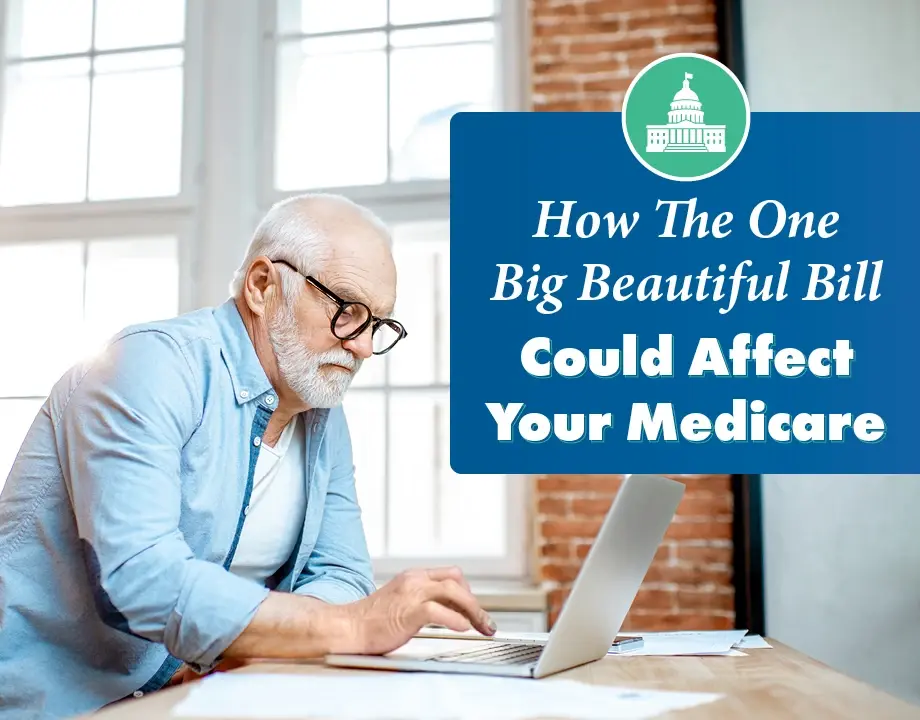
How The One Big Beautiful Bill Could Affect Your Medicare
President Trump’s One Big Beautiful Bill has been in the news a lot.
But what does it mean for your Medicare coverage and costs?
The White House says clearly:
“Medicare has not been touched in this bill— absolutely nothing in the bill reduces spending on Medicare benefits. This legislation does not make a single cut to welfare programs—it safeguards and protects these programs for all eligible Americans.”
That’s mostly true. There are no direct cuts to your earned Medicare benefits.
But the bill does include some indirect changes that could affect your costs or eligibility.
Let’s take a closer look.
Get Your AEP To-Do List
This easy-to-understand list for the Medicare Annual Enrollment Period will help you save money, ensure your benefits are the best they can be, check that your doctors are still in network, & more.
Get My To-Do List
What Is The One Big Beautiful Bill?
Signed into law on July 4, 2025, the One Big Beautiful Bill (OBBB) is a large package that includes changes to taxes, government spending, and health care. It:
- Extends tax cuts that started in 2017
- Cuts over $1 trillion from Medicaid and other health programs like SNAP over the next 10 years
- Includes new rules that affect Medicare drug plans and low-income benefits
What Doesn’t Change
- Your core Medicare coverage (Parts A and B) stays the same: You can keep using Medicare or your Medicare Advantage plan just as before. No benefits have been taken away.
- Medicare Advantage and Medigap plans remain available: Your plan choices, doctor networks, and Medigap options are not affected. In fact, the bill gives a small boost in doctor payments in 2026, which may help maintain access to care.
- The $35 insulin cap and $2,000 drug spending cap are still happening: These changes from a previous law are safe. Starting in 2025, insulin won’t cost more than $35/month and total drug costs won’t exceed $2,000/year.
- Your premiums haven’t gone up because of this law: Medicare premiums may still rise slightly each year, but OBBB didn’t add new charges for you.
What Does Change
Medicare Eligibility Limits for Immigrants
Before the One Big Beautiful Bill, many lawfully present immigrants could qualify for Medicare if they worked and paid taxes or met residency requirements—just like U.S. citizens.
OBBB changes that by narrowing who is allowed to enroll based on immigration status.
Now, only the following groups can newly enroll in Medicare:
- U.S. citizens
- Lawful permanent residents (green card holders)
- Cuban and Haitian entrants
- Individuals from specific Pacific Island nations covered by special U.S. agreements (known as “COFA” migrants)
And these groups are no longer eligible for Medicare:
- Refugees and people granted asylum
- People with Temporary Protected Status (TPS)
- Survivors of human trafficking
- Survivors of domestic violence
- Individuals granted humanitarian parole
Undocumented immigrants were never eligible for Medicare, so this change doesn’t affect them. But it’s a major shift for many legal residents who previously qualified.
By July 2026, Social Security must notify anyone currently on Medicare who no longer qualifies. Their coverage will end in January 2027.
Drug Price Negotiation Limits
The Inflation Reduction Act of 2022 gave Medicare the power to negotiate lower prices on certain high-cost medications, with the first discounts set to begin in 2026.
The One Big Beautiful Bill makes some rare-disease drugs, known as “orphan drugs,” off-limits for negotiation.
As a result, fewer drugs will qualify for price cuts, and some of the most expensive medications may stay costly longer. Many commonly used drugs are still included, but people who rely on specialty medications may see less savings than originally expected.
New Rules for Pharmacy Benefit Managers
Starting in 2028, OBBB will crack down on how Pharmacy Benefit Managers (PBMs) operate in Medicare Part D drug plans.
PBMs help manage drug pricing and coverage behind the scenes—but until now, there’s been little oversight or transparency.
Here’s what’s changing:
- More transparency: PBMs will be required to report detailed information to Medicare and plan sponsors, including:
- What each drug costs and how often it’s used
- How much is spent at PBM-owned pharmacies
- Why certain brand-name drugs are chosen over generics
- Flat-fee payments: PBMs will no longer be paid based on the price of a drug. Instead, they’ll receive a flat service fee, removing any financial incentive to favor higher-priced medications.
- Standard pharmacy contracts: Right now, Medicare drug plans set their own rules for which pharmacies can be in their network. Starting in 2028, the government will create a standard contract so more local and independent pharmacies can participate.
These changes are meant to bring more clarity to how drug prices are set, reduce hidden costs, and give you more options for where to fill your prescriptions.
Delayed Low-Income Benefits Enrollment Help
The government is putting a long pause on new rules that would have made it easier for people to enroll in Medicare Savings Programs (MSPs)—programs that help low-income seniors pay their Medicare Part A and Part B premiums and other out-of-pocket costs.
The pause also applies to similar enrollment improvements for Medicaid, CHIP (the Children’s Health Insurance Program), and the Basic Health Program.
These new rules were supposed to simplify the enrollment process by cutting down on paperwork and allowing for more automatic enrollment, helping more people get the benefits they qualify for.
But under the One Big Beautiful Bill, those improvements are on hold until at least September 30, 2034.
The programs still exist—but without the streamlined process, you’ll need to be more proactive.
Changes to Medicaid
If you’re dual-eligible for Medicare and Medicaid, you could be affected by some of the changes the One Big Beautiful Bill is making to Medicaid.
Here are the biggest changes to Medicaid:
- New work requirements: Adults under 65 who receive Medicaid may need to meet work requirements. (If you’re 65 or older, you’re exempt.)
- More frequent eligibility checks: Starting after December 2026, states will be required to verify Medicaid eligibility every six months instead of once a year. (You may be exempt if you live in an assisted living facility, nursing home, or receive Home & Community Based Services.)
- Immigration restrictions: Some lawfully present immigrants will lose Medicaid eligibility—similar to the new Medicare rules.
- Reduced state funding options: The bill limits how states can use “provider taxes” to help fund their Medicaid programs, which could affect state budgets and coverage options in the future.
If you’re dual-eligible and you lose Medicaid coverage, you’ll be responsible for the costs it used to cover, including:
- Your Medicare Part B premium ($185/month in 2025)
- Co-pays and deductibles
- Dental, vision, and long-term care services that Medicare doesn’t cover
If this applies to you, make sure your contact information is up to date and respond to all renewal notices. Missing paperwork could result in losing your coverage, even if you still qualify.
Rural Healthcare + Senior Tax Relief
Not everything in the One Big Beautiful Bill is a cut. There are a couple of wins that could make a positive difference for seniors—especially those living in rural communities or on a fixed income.
Rural Healthcare Investment
The law creates a new Rural Health Transformation Program, which will provide $10 billion per year from 2026 to 2030 to strengthen rural healthcare systems.
This funding can:
- Help small hospitals stay open
- Expand telehealth and virtual care options
- Recruit and train doctors in rural areas
- Improve care for chronic conditions and older adults
For seniors living in small towns or rural counties, this could mean better access to care closer to home, fewer long drives for appointments, and more consistent support for ongoing health needs.
Tax Relief on Social Security
The White House says the One Big Beautiful Bill will mean “no tax on Social Security” for most seniors—and financial experts agree it’s likely to work that way.
While the bill doesn’t directly change how Social Security is taxed, it does add a temporary $6,000 bonus deduction for anyone 65 or older, starting in 2025 through 2028.
Thanks to this larger deduction, about 88% of seniors—roughly 51 million people—will owe no federal tax on their Social Security income.
The deduction is also retroactive to 2025, so you could get money back when you file.
We’re Here to Help
Medicare is complicated enough without Congress passing massive legislation like the One Big Beautiful Bill. But don’t worry, your Sams/Hockaday agent is here to help.
We stay on top of policy changes, review your Medicare plan options every year, and help you apply for programs that lower your out-of-pocket costs.
Most importantly, we’re here to explain what these changes mean for you—so you can feel confident about your coverage moving forward.
Call us today to schedule your free Medicare check-up or ask any questions about how the OBBB might affect your plan.
Schedule an Appointment
Book time right on our agents' calendars using our online scheduling system.
Choose Appointment


